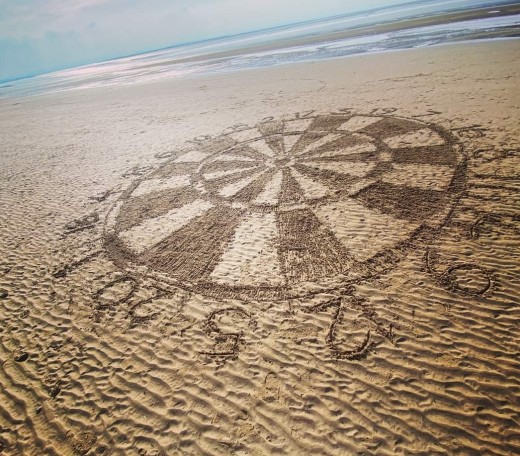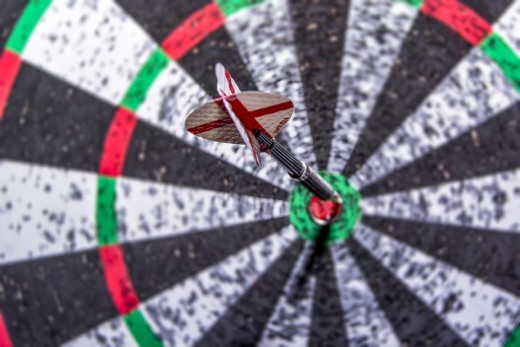November 1, 2005
Column 200
Old Stoneface
Imagine my surprise… my curiosity… my CONCERN… when I arrived home the other day to hear my wife, casually mind you, say: “a package came for you today; it’s in a brown paper wrapper.”
Oh. Oh.
A BROWN PAPER WRAPPER! What could it be?
I picked the small package up off the counter and examined it. The postmark read “Royal Mail.”
Hmmm…
Let’s be clear straight-away. Unless your name is Tony or Raymond (or Olly or Martin), there isn’t anything in John Lowe’s new book, Old Stoneface, that’s not worth the price. If you’re a darter at any level, or if you just want a good read about life, my advice is to go out and buy it NOW!
If by chance your name is Tony or Raymond, be forewarned. Tony: Your head’s gonna spin like Linda Blair’s did in The Exorcist. You’re gonna spew green until cows fly like budgies. Raymond: Jij trekt de deurknop van de deur! (You’re gonna rip the hinges off the old barn door!)
And if your name is Olly or Martin: shame on you!
Let’s be clear about one more thing. Keep reading this if you wish, but I am not going to reveal the really good stuff. Lowe spent sixty years living the life for his autobiography, toiled by candlelight for a year writing it, and waited for days for the libel lawyers to ensure that no one could sue his Unicorn-tossin’ arse.
As someone who devotes considerable time to knocking out these columns (once one of them took me over a frickin’ hour) and has had some frightening personal experiences with libel lawyers, the last thing I am going to do is name names or disclose the juicy details of Lowe’s hard labor.
Occasionally, as above, I am going to have to write in code – to whet your appetite to go buy the book and not spoil the surprises that are in it. Sometimes I may even have to stretch the truth a tad. To Lowe and to darts historian Patrick Chaplin, who collaborated on the work, I apologize.
I first met John Lowe at an exhibition that he and Cliff Lazerenko gave at Molly’s Pub (585 Route #28) in Yarmouth, Massachusetts on Cape Cod. To say I was impressed with the man would be a gross understatement.
That night Lazerenko slaughtered me. But it’s something Lowe did that left a lasting impression in my mind.
Before the exhibition began, as people were still milling about, Lowe walked with me to one of the boards. Repeatedly, he poked one of his darts into the board and moved it around to loosen the packed sisal. Into the triple twenty he stabbed his dart… into the triple eighteen… into the bull, and elsewhere, and explained that there was no use throwing a dart unless the board was in proper condition to accept and hold it. He then asked me to let him see my darts. He turned them over in his hand and began to press on the flights. He explained that flights couldn’t perform their purpose if they were not fully separated.
Little lessons. I still go through both rituals every time I shoot. But it is not so much the lessons I have remembered all these years as it is kindness of the man himself. John Lowe took the time to spend time with me, someone he didn’t know, and share bits of his immense darts knowledge. At the time, I found this unusual. I feel the same way today.
Although we have come to know each other since that night at Molly’s, and have even worked together on a couple of articles, I am one, no doubt just one among thousands and thousands, who was touched by this special man many years ago. He was different than many of the other top professionals. He fanned my passion for the sport. I have often wondered how he came to be the ambassador of respectability that he is.
Lowe’s book answers this question. For this reason alone it demands to be read.
Steve Rushin once wrote in Sports Illustrated that “…a dart is not merely rocket-shaped; it can be a rocket and generate escape velocity to break away from the gravitational pull of poverty.” Darts did this for John Lowe.
But for a twist of fate, Lowe would most likely be toiling away in obscurity today, deep in a coal mine in New Tupton, the village where he was born. But for another twist of fate, he’d probably be pushin’ up daffodils in a graveyard somewhere beside the moors. But for yet another twist of fate, the legend we all know today may never even have handled a dart.
But the stars kept lining up and Lowe, a deep believer in fate (being raised Jewish) followed the light. He became a carpenter instead of a miner. He sold his motorcycle. Finally, with his darts he broke far, far away from that nasty tug of gravity towards an entirely different place.
Darts have taken John Lowe to the top of the sporting world, to the avenues of glitz and celebrity, and to the kind of bank account he would once never have dreamed to imagine.
Three times, he’s been world champion. More than 100 times, he’s represented his country. For seven years, he captained England’s team. He’s done his country and darts proud in every corner of the planet. He’s schmoozed with Muhammad Ali. He’s slept with Madonna.
Okay. Okay. He’s not Jewish. But the part about Madonna… well, read the book!
He has more than 1,000 tournament wins to his credit. If during his prime he’d not had to toe-the-line week after week against Eric Bristow, who knows – Lowe (or Bristow) may well have won more world titles than Phil Taylor. In 1984, Lowe hit the first-ever televised perfect game and pocketed 102,000 pounds ($181,000). In today’s dollars, that’s the equivalent of $421,000!!!
DON’T EVER let anyone tell you Phil Taylor hit the first nine-darter or that his paycheck was bigger.
Lowe was one of the trailblazers in the World Darts Council’s (WDC), now Professional Darts Corporation (PDC), battle with the British Darts Organization (BDO) which with the Tomlin Order in 1997, earned players the right to earn a living, without restriction. A dozen years prior, he was one of the founders of the Professional Dart Players’ Association (PDPA).
Darts have also taken Lowe to the depths of despair.
He’s been married, divorced, and married again. He’s opened a bar, been ripped off, lost his money, and earned it back. Over the years, several of his closest friends have passed on – Barry Twomlow, Peter Lippiatt, Leighton Rees, Tom Fleetwood, and Bob Murdock.
But through all the joy and tears (and there is SO much more – buy the book, damn it!) Lowe has remained true to his beliefs, loyal to his friends and country, kind to strangers (and probably whales and small animals), and today he stands alone above all who came before or have come since as the classiest of class acts in the darting world.
Indeed, Twomlow (as Lowe paid tribute to in his book) may have been the “man who taught the world to play darts,” but Lowe is the gentleman who enlightened us to its honor and grace.
In British society there are something called Honors, bestowed by the Queen, to recognize “exceptional achievement or service.” Those of you outside of England may have only heard of a few of them, perhaps Life Peers, Baronetcies, and Knighthoods.
Among these Honors are the Orders of Chivalry, established by George V during the First World War, which include five levels of an Honor called The Most Excellent Order of the British Empire. Since 1917, only once has a dart player been recognized, at any one of the levels – as a Member (or MBE). That was Eric Bristow in 1989. (Phil Taylor was to be recognized in 2001 but the Honor was withdrawn.)
The Order of the British Empire has a motto: For God and the Empire. The story of John Lowe’s life, so honestly shared in his autobiography, Old Stoneface, is the representation of the heart of all that is inherent to the bestowing of this great Honor.
The book deserves a read.
And when you put it down you will agree that John Lowe deserves an MBE.
From the Field,
Dartoid




